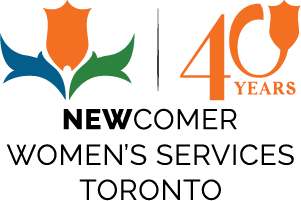Meet some “NEW” people: English Teacher Elizabeth Wickwire
Elizabeth Wickwire is one of the English teachers at Newcomer Women’s Services.
BY REMA AL NADER
Hailing from Halifax, Nova Scotia, English teacher Elizabeth Wickwire always knew she wanted to be of service to others. At first, she resisted the idea of becoming a teacher because she didn’t want to copy her mother, and she thought helping people had to be a more grandiose endeavour. However, this perspective has changed through her life experiences.
A turning point in Elizabeth’s life presented itself after completing her bachelor's degree in sociology and French at Dalhousie University. “After graduation, I had an interest in international travel. Being a native English speaker, I took advantage of an opportunity to teach English in Japan,” she recalls.
"I was the only foreigner in this small town surrounded by rice fields, and I had to learn to adapt and survive without having much knowledge of the culture or language. This instilled in me a confidence and belief in myself that enabled me to pursue teaching opportunities in other countries, like Saudi Arabia and Bangladesh.”
Elizabeth Wickwire
After Japan, Elizabeth began her master’s degree in international development education at OISE/U of T with the hopes of working for an international aid organization. “I went to Nepal for my master’s research project and had the opportunity to work with internally displaced youth in the midst of the 10-year civil conflict in Nepal. It was a small locally-led peace-building organization. The Nepali director, Rita Thapa, soon became a very influential mentor in my life and she showed me how ‘development’ is done properly. She believed every detail within an organization’s operation should reflect its core values. And for her, these were inclusive, non-hierarchical, feminist values.”
Elizabeth Wickwire with her students from around the world from Japan to Nepal to Toronto..
Elizabeth’s dream of being an international aid worker soon took a turn as she realized that there were inconsistencies in the international aid model. “Big international funders have certain ideas regarding the ways in which things should be done. If smaller local organizations did not shift to accommodate the big funders, then they simply didn’t get funded. So, the big funders were pursuing their own agendas and certainly not living up to their rhetoric of supporting ‘autonomous local development.” she recalls. “It was absolutely disheartening and disillusioning.”
" The community at NEW is so close-knit and collaborative. English teachers are not only helping students excel in their language learning, but we’re building social safety networks for these newcomer women. They arrive in a new country feeling alone, but come to our classes and find a community that gives them friends, confidence and a place to share stories, both good and bad."
Elizabeth Wickwire
What is the hardest thing about teaching newcomers? “First, it is keeping your mouth shut,” Elizabeth says. “ Allowing the students to struggle a little to find the words and structures to express themselves. The learning is in the struggle, so you have to fight the desire to help them out all the time And, it’s hard to not have the capacity or power to fix all the other problems in their lives.” Elizabeth is looking forward to going back to in-person instruction next year. “I am doing what I love and I can’t wait to get back into the classroom.”
Are you new to Canada and interested in learning English in a supportive, all-women environment? Click here for more details.


